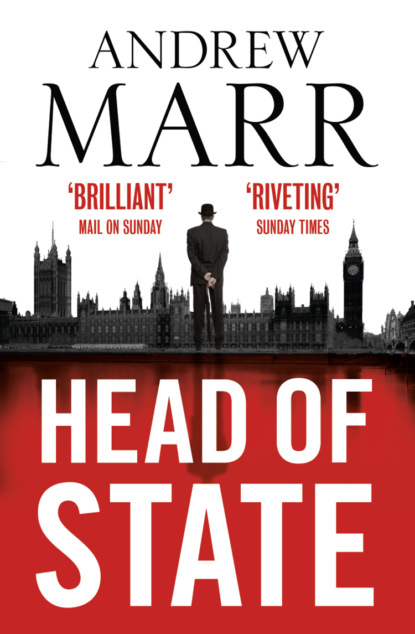По всем вопросам обращайтесь на: info@litportal.ru
(©) 2003-2024.
✖
Head of State: The Bestselling Brexit Thriller
Автор
Год написания книги
2018
Настройки чтения
Размер шрифта
Высота строк
Поля
He could afford that: Haydn Communications had smashed through the old world of gentlemanly corporate public relations back in the 1980s, not long after Nigel Lawson had smashed up the cosy old world of the City: one of Alois’s big breaks had come from the privatisation of British Gas. His early years were lost in mystery, but he appeared to be a member of a famous family. His much older sister Camille Haydn had won the Turner Prize with her installation on the history of female sexuality, and his much younger brother Liddell Haydn was the eponymous creator of the successful TV production company. Haydn himself was of almost Middle Eastern appearance, and some said he had been plucked from a children’s home – there were no pictures of him from his early childhood. But he never spoke of such things, either to friends or in public.
Haydn’s bride, the daughter of the radical Tory peer and landowner Lord Mortlake, had brought him modest inherited wealth and an entrée to the highest levels of the Conservative Party. The wealth and the contacts lingered on after the dissolution of the marriage when Alois came out. He was now in a civil partnership with the Indian short-story writer Ajit Gupta. It was often stated by those who claimed to know that Haydn was ‘more New Labour than anything’, and he had certainly prospered under Tony Blair. He had given Tony, Cherie and the children the use of his holiday villa in Umbria, and had been pictured playing tennis with Tony at Chequers. Peter Mandelson was said to have him on speed dial.
Alois Haydn was, it seems, a hard man to pin down, and a hard man to describe. On this particular morning, walking past the Ritz in the late-summer sunlight, he was on his way to meet a roomful of people who prided themselves on being good observers – some of them professionally so. What might they have noted down?
They would have reported that Haydn was a man of something below middle height, and of average weight, and of middling years. His hair was light brown, and slightly curled. His face was olive-shaped and avocado-coloured, with dark, sunken eyes like two soft dates. He could almost have been Indian. His suit was Ozwald Boateng, and his shoes were Italian brogues. He wore a light-grey silk tie over a cream shirt, and his nails appeared to have been varnished. His views? Unfathomable. His educational background? Unknown. His psychological drive? Hush. He carried a small leather bag neatly in both hands, and he walked so lightly it was almost as if he were being blown gently along by the wind.
The Dither Fund (#ulink_3f50e9eb-bfb4-5214-8b1e-fbc1bda368d7)
Alois Haydn carried his wealth lightly too. He called the substantial reserves of money he had amassed his ‘dither fund’ – inheritance and earnings he had been thinking about investing in property, shares or holiday treats, but had never got round to using. Because it was just sitting in the bank, slowly losing value, he also called it his ‘ice money’: drip by drip, it slowly shrank in value and leaked away. When, just before the previous Christmas, he had finally stopped dithering, the dither fund stood at £4,745,201.20. He wired most of it to a new account in the Gulf, cashing out the remaining half a million in £50 notes. This took a lot of paperwork, tedious discussions with bank staff and nervous packaging, but he eventually had the sum wrapped in waterproof paper and jammed into a rucksack.
Alois may have had an obscure background, but he had a very clear mind. Britain, he believed, was finished. Thirty years of spending ever more money on ever pleasanter lifestyles, while working ever less hard and ever less efficiently, had done the once-great nation irreversible damage. Tory and Labour alike: locust years. It wasn’t politics. It was decadence.
As Alois saw it, there were now two possible courses of events. Either the socialists would get back, and in the prevailing mood of public outrage the demands for higher taxes would drive the rich and the foreigners out, fleeing London like flocks of migrating birds affected by a sudden chilling in the weather. Or, despite the best efforts of the current prime minister, the radical and nationalist right would take over, doing enormous short-term damage to everything, including employment. Either way, property prices would crash, and those who remained in Britain would have nowhere safe to put their money. Alois didn’t trust government assurances about the security of the banks. He knew a little history.
He had screwed up his courage to talk about his worries with the prime minister. It wasn’t easy. The PM had a way of looking at you, his forehead creased and his thick, shaggy eyebrows casting dark shadows over his eyes, his mouth twisted in a wordless disdain that had you beaten in argument before he said a word. When it finally came, his voice – all gravel and pebbles and fast-running water between them – reminded Alois of his recent personal triumph in Germany, and the possibility of a negotiated solution acceptable to all sides. The very thing he was putting to the country in a referendum.
‘Why, Alois, do you suppose I am ruining – ruining – my health, and shredding what’s left of my popularity, if not to steer the poor old British people deftly between the two disasters you so eloquently describe? Grab the tiller. Port and starboard: the economically illiterate socialist Scylla and the saloon-bar nationalist Charybdis. My job is to jam wax into the ears of the people and get us past the Sirens, through the white horses and out into the open sea. And I will, if it’s the last thing I do. Believe me, Alois. Stick with us, and leave your money where it is.’
Alois had always admired the prime minister just this side of idolatry. It was his only weakness, and he rather liked himself for it. But after this conversation, and despite the prime minister’s almost hypnotic stare, he walked away unconvinced. Two days later he liquidated the entire dither fund and bought tickets for himself and Ajit to Dubai.
Various interesting people from the Islamic Republic of Iran and the Pakistani security service had found Dubai more discreet than Switzerland and as secure as Singapore – as well as much nearer than either. The banks there would open an account for a large amount of currency passed across the counter with the minimum of questioning or paperwork. The architecture, the heat and the vulgarity of the shopping were minor inconveniences compared with the helpfulness of the financial institutions.
Ajit, dejected by the appalling British weather, had jumped at the idea of a brief break in Dubai, and was touched when Alois packed for him. It almost made up for his steerage-class ticket – Alois, as always, travelled first class. But when Ajit discovered, while delving in his rucksack for his washbag at Dubai International Airport, that he had just unwittingly carried a vast sum of sterling through customs, while Alois had brought only a few T-shirts and a credit card, the couple had their first big row.
‘But you got away with it,’ Alois had defended himself.
‘That’s not the point. You deceived me. You did it coldly, and you put me in danger. You behaved like a shit.’
‘For God’s sake, Ajit. Nobody travelling in steerage with a rucksack is going to be checked for currency. You get past the dope-sniffer dogs and you’re home free. It would have been much more risky if I’d had it in my luggage. And if I’d told you about it you’d have been pathetic – all camp and sweaty and scared – and you’d certainly have been caught.’
‘Don’t call me pathetic. And don’t you dare call me camp. I’m not “camp”. I’m not “gay”. I’m not “queer”. I’m just an old-fashioned, straightforward bugger. And I’m damned proud to be a bugger. All I ask, Alois …’
Their voices had been raised enough to attract the attention of the businessmen and white-robed taxi drivers standing around the arrivals hall. The country was full of proud buggers, but they didn’t often talk about it in loud voices in public places.
The argument fizzled out, but it left Ajit in a terrible mood, and spoiled the holiday for both of them. Alois had taken the money off to the bank recommended to him by his wealth manager at Raworth & Reid in London and opened a new and untraceable account, the ultimate insurance, which even in Dubai took an entire morning. Ajit was left to sun himself by the hotel pool, which proved to be greasy with tanning lotion and full of writhing, screaming Arab teenagers throwing footballs and splashing each other. And the sun was far too hot. He decided that he hated Dubai, and retreated indoors to the fitness suite to work off his bad temper on some kettle bells and the treadmill.
A wiry, tousle-headed man, dressed only in a pair of shorts, was grunting away on the rowing machine. Both of them did a hard forty minutes in the gym before starting to talk under the refreshingly cold showers. The rower introduced himself as Charmian Locke, a ‘sort of banker’ from London, and added nastily, ‘You musht be the only Indian staying in a fuck-off place like thish.’
The speech impediment – made all the more noticeable by his huge teeth, like gleaming white tombstones – bothered Ajit. It seemed to come and go. Could it be an affectation? Nevertheless, he explained that his partner had come to invest some money here, and said that Dubai struck him as a bit of a hole.
‘It’sh not so bad. The trouble ish, it isn’t Arab and it isn’t Western,’ said Charmian. ‘It ish a hole, I shpose – the hole between the two.’ He and Ajit talked about why so much money was being made in this surreal, gritty little country. Ajit, as a writer, both respected money and was frightened by it. But Charmian’s evident greed and cleverness were catching, and Ajit began to find his new acquaintance’s conversation as interesting as his teeth were alarming.
However, by the time he and Haydn, both of whom were still disgruntled with one another, returned to the airport a few days later, he had forgotten Charmian. But then they bumped into each other in the queue. Ajit introduced him to Alois as the brilliant money man he’d met in the hotel gym. Naturally, Charmian was travelling at the front of the plane, and he and Alois talked non-stop all the way to London. One of the great things about first-class air travel is that it puts all the crooks together.
Charmian Locke had worked for one of the biggest investment banks in the world before his blog about life in the City after the financial crash was tracked to his trading computer and he was fired for breaking the firm’s confidentiality clauses. The truth was, he had been bored. His deserved reputation as one of the shrewdest brains on the trading floor meant that he was soon contacted by a friend of his father’s, Sir Solomon Dundas, a flamboyant former private banker now with a company called PLS, with a proposal concerning his future employment. The money wasn’t great, but the job was.
‘He’s a damn clever fellow. New generation. Perfectly respectable – just don’t let him smile at you,’ was the judgement of Solomon. And so it was that Alois Haydn came to have yet another link with Professional Logistical Services.
Professional Logistical Services (#ulink_740f9246-6044-57ad-bb13-aa84f0d84885)
At his insistence, the group of eminent public Britons had convened to meet Alois Haydn in a private club off Shepherd’s Market. He’d ordered them over there, and now he’d ordered them over here. The man was a maniac for secrecy. There was an air of irritation in the room, as they had all left urgent work. They were unaccustomed to being summoned, and unaccustomed to waiting.
This club was a remnant of a London that – so far as outsiders imagined – had long disappeared. It was the London in which gentlemen never wore brown shoes except with corduroy trousers and tweed jackets; the London whose tobacconists mixed cigarette blends just as sir preferred, and where Purdeys were bought in pairs for young sons; the London of unmarked doors, of Albany chambers (not ‘flats’, still less ‘apartments’), where the tea was forever Darjeeling and the gins only came pink. It was a London, frankly, that was mostly now for sale to wealthy foreign nostalgists. But there were still a few pockets of the old ways.
A circle of padded leather chairs had been arranged in front of an ornate marble fireplace. One of those present was actually smoking – tobacco. A discreet handwritten sign on the door told club members that the Red Library had been reserved until lunchtime by ‘PLS’. The full name of the company whose executive had gathered in the small, stuffy room in Mayfair had been deliberately chosen because it was the dullest and most meaningless available.
The average age of the people assembled in the room was well into the seventies, and one weatherbeaten and famous face must have been ninety if he was a day. Yet the gathering unmistakably exuded power as well as experience. An informed observer – Ken Cooper, say – would have recognised everyone there.
Admiral Lord Jock Dalgety, former chief of the Defence Staff, was rubbing his long red nose and muttering something to General Sir Mike Patten, who had led the British forces in Iraq and who still failed to look convincingly like a businessman. Dame Cecily Morgan, former director of MI5, was sitting utterly still and silent, her hands neatly folded in her lap. She had been recruited by General Patten after a late-night club dinner when they had found themselves the last two guests remaining at the table for ten.
‘What, really, do you have to look forward to, Cecily?’ he had asked her as they nursed their brandies.
‘Well, Mike, I guess five or six more years of independence in my flat, learning to cope with just a little more pain each year, and then the usual expensive, overheated, piss-scented home. Suffocating, those places. I’ve got a few nieces and nephews, but no children. That’s what the service does to you. I’m luckier than most: there’s enough money left for decent wine and a film-channel subscription until I finally kick the bucket.’ Even as a young woman, Cecily had been known for her blunt speaking.
The old general nodded vigorously. ‘For me, what I really dread is the old girl going first. Left to myself it’ll be too much whisky every evening and then a fall in the bathroom one night when I’m stumbling around on my way for a piss. Can’t even enjoy the theatre any more. Weak bladder. The old girl does a decent omelette, and keeps an eye on me, but she’s not well. They train you for the battlefield and what might happen there, but where’s the situation report for those last ten years?’
Patten then began to describe a more interesting possible final chapter to Dame Cecily, earning decent money and travelling, even at her advanced age, to some interesting parts of the world where she might actually meet some rivals from the old days whom she had never dreamed of seeing face to face. The powers that be wouldn’t be happy, but what could they do? God already Called her God. She hadn’t been hard to convince, particularly when she learned that the mysterious company contained many people she had known for most of her working life. Lord McDonald, the fire-eating chairman of United Meats, and Baroness Tessie Fremantle, the Miss Marple-featured former permanent secretary at the Treasury, would be among her colleagues. As would Dickie Greene, the hairy-eared, scarlet-jerseyed former director of the Secret Intelligence Service and chairman of the Joint Intelligence Committee.
Every one of those now assembled in the room had done things in their past that they would prefer didn’t become public – cooked figures, spread deceptions, strangled careers, and in Dame Cecily’s case looked the other way while enemies of Britain were tortured, even killed. All of them were lined and creased by years of responsibility and hard choices. None of them had many years left. They were all ‘comfortable’ in the narrow financial sense, but they had all been uncomfortable, itchy and uneasy in the constricted world of retirement. One last adventure mattered much more to each of them than any paycheque that might be involved.
Despite the high average age of its senior board and their general air of languor, PLS was a comparatively recent organisation. It had been founded in 1988 by some former members of the intelligence services, senior military officers and a few financial eagles to bring ‘advanced research techniques’ to British companies that found themselves in some sort of trouble. In the letters of association and early discussions about contracts, nothing remotely illegal was ever mentioned. ‘No guns, no bugs, no break-ins. Except as a last resort’ was PLS’s unofficial motto, and the company prided itself on maintaining a façade of utter respectability.
Much of its work was simply about reaching the right people, and putting the right people in touch with each other. You wanted to build a power station in Turkey? PLS would find the minister whose approval was essential. You had failed to win a major contract in Russia? PLS would find out why, and would even be prepared to sell you the most confidential details of the winning bid. If a major bank was in trouble with the FSA over allegations of money-laundering in South America or the Caribbean, PLS could find out exactly who had opened certain accounts, who had been paid to do so, and quietly negotiate with the appropriate law-enforcement agencies in the US to smooth things over.
Ex-ambassadors would pick up the phone to call State Department officials they used to play golf with, or former SIS officers would drop in on old contacts in Florida or Mexico City. If there were difficulties over some necessary but discreet payments being made to a Saudi prince in connection with a contract for a turboprop training aircraft upon which many hundreds of jobs in Walsall depended, Professional Logistical Services soon came to expect a call. Everything would be explained in due course: the no-doubt-necessary but not-discreet-enough payments had been ‘misunderstood’ – the prince, who was a humanitarian as well as a patriot and a businessman, intended to use the money to improve the working conditions of Bangladeshis in the Kingdom. The money was not baksheesh, but aid. And so the world turned, and the client book grew thicker. PLS opened doors most people didn’t even know existed. It was virtually unknown in the wider world. But its success rate was very high.
The company’s offices were in a cul de sac by Green Park, a hundred yards north of Clarence House, sandwiched between a boutique hotel and the headquarters of a hedge fund. Analysts, number-crunchers and secretarial staff worked long hours in the small, cream stucco building’s quiet, wood-panelled rooms.
In the hot, smoky room in Shepherd’s Market, Dame Cecily turned to Admiral Dalgety.
‘Really, Jock. Where is the little cunt?’
The Romance of Fleet Street (#ulink_8ed9f705-401a-5c9b-abc0-7830aefd21c6)
Every senior member of Professional Logistical Services had a file devoted to them in the offices of the National Courier. There were blurred old photographs, articles about long-forgotten defence-spending rows and minor departmental scandals, queen’s birthday honours lists from the old days, and obituaries waiting to go. But there was nothing that connected the names to each other, and not a single reference, even from the business pages, to PLS. And this, by the standards of the day, was a decent enough newspaper, still just about hanging on.
All newspaper offices are much the same – the filthy beige walls, the desolate expanse of cluttered desks behind which wise old sacks of human indolence order the young and stupid about. Ken Cooper was the editor here, the commander of his own poop deck, not because he was the oldest, or the cleverest, or the most frightening – though he was fairly old, and very sharp, and borderline scary – but because he was more alive than anybody else in the office. His heart pumped richer blood. His lungs sucked in more of the sparse, air-conditioned oxygen. He laughed louder. His rages were more extreme. Even between the desks, even in the narrow corridor leading to the lifts, he didn’t walk so much as romp. He bounced and roared and flung his arms about when everybody else was catatonic with exhaustion; and so he raised up the cynical and made them care, he roused the bored and made them curious. He was the model of a newspaper editor, and his Anglo-Saxon was famously fluent.
‘Quintfuckingessence of fuck, in twelve-fucking-point bold fucking Bodoni. Fuck in eleven fucking dimensions.’
‘Well, fair point, boss.’
‘Fuck this fucking paper and all who fucking sail in her. We’re all fucking drowning. Fuck you. Fuck me. In fact, fuck me sideways with an Atex machine and a lot of fucking enthusiasm. And fuck my fucking wife while you’re at it.’
‘Didn’t know you’d remarried, boss.’
‘I haven’t. Fuck off … you … you …’









